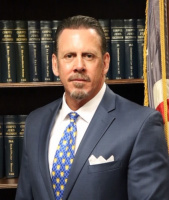 Louisville Felony Lawyers, Nebraska
Louisville Felony Lawyers, Nebraska
Sponsored Lawyers
1-3 of 3 matches
Criminal, Felony, DUI-DWI, Domestic Violence & Neglect, Firearms
Attorney Tom Olsen handles criminal defense cases in Omaha, Douglas County and throughout Nebraska. With over 30 years experience, Tom is generally considered as one of the most competent and skilled criminal defense attorneys in the Omaha area and has been involved in the representation of clients involved in many of the more higher-profile criminal cases in the Omaha area over the past several years. Call 402-598-5789 to schedule a free consultation today.
(more)Criminal, Personal Injury, Felony, Misdemeanor
James N. Scarff, II, is a transplant from Jackson, Mississippi, where he was born and raised. After high school he initially played football at the University of Mississippi until an injury ended his football career. He then transferred to Millsaps College in Jackson, Mississippi where he would receive his Bachelor of Business Administration Degree in May 2003. Shortly thereafter, James received his Master of Business Administration degree from Millsaps College in May 2005. While at Millsaps College he received the Millsaps Award, Endowed Scholarship, and the Dean’s Scholarship. In August of 2005, James began law school at Mississippi College School of Law in Jackson, Mississippi. While in law school, James was a member of the Environmental Law Society and one of the founding members of the Sports & Entertainment Law Society, while managing to stay on the Dean’s List. After graduating in the top quarter of his law school class, James went to work for The Penton Law Firm out of Bogalusa, Louisiana where he practiced Mass Tort Litigation. His firm also served on the Plaintiff Steering Committee (PSC) for those harmed by the Federal Emergency Management Agency (FEMA) in the wake of Hurricane Katrina. His main focus at the firm was global pharmaceutical settlements and Multi-District Litigation (MDL). Those cases included Vytorin, Vioxx, Celebrex, Viagra, DPC Arizona, and other mass tort actions. Over $400 million in settlement funds was distributed. In June 2009, James moved back home to his roots in Jackson, MS and started his own practice. At Scarff Law Firm, LLC, James took on personal injury cases, domestic/family law cases, DUI, criminal defense, and business transactions. At that time, he was also general counsel for three separate businesses. While continuing his own practice, James became a trial lawyer associate at The McRae Law Firm, PLLC, in May 2012 and worked on briefing appeals to the Mississippi Supreme Court as well as Federal Court in the Northern and Southern Districts of Mississippi. In December 2015, James reconnected with his old high school sweetheart who had moved to Omaha, Nebraska after college. After a brief courtship, he married Emily Knight Scarff in May 2017 and promptly moved to Omaha, Nebraska. Where he shares a blended family with his wife. He has two step-sons, Hayden and Hudson Koesters, and a new addition to the Scarff Family came in September 2018, Colt Hayes Scarff. James also has a daughter, Emery Rose Scarff, who resides with her mother back in Mississippi.
(more)





